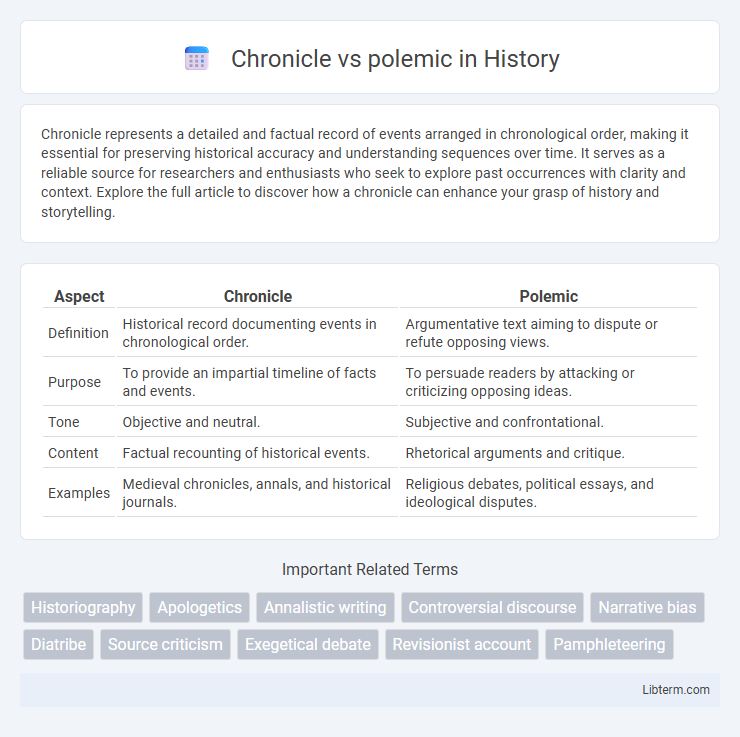Chronicle represents a detailed and factual record of events arranged in chronological order, making it essential for preserving historical accuracy and understanding sequences over time. It serves as a reliable source for researchers and enthusiasts who seek to explore past occurrences with clarity and context. Explore the full article to discover how a chronicle can enhance your grasp of history and storytelling.
Table of Comparison
| Aspect | Chronicle | Polemic |
|---|---|---|
| Definition | Historical record documenting events in chronological order. | Argumentative text aiming to dispute or refute opposing views. |
| Purpose | To provide an impartial timeline of facts and events. | To persuade readers by attacking or criticizing opposing ideas. |
| Tone | Objective and neutral. | Subjective and confrontational. |
| Content | Factual recounting of historical events. | Rhetorical arguments and critique. |
| Examples | Medieval chronicles, annals, and historical journals. | Religious debates, political essays, and ideological disputes. |
Introduction to Chronicles and Polemics
Chronicles are historical accounts that present events in a sequential and objective manner, aiming to inform readers with factual details. Polemics are argumentative texts designed to persuade or refute opposing viewpoints, often using rhetoric and emotional appeals. Understanding the distinction between chronicles' neutral narrative style and polemics' persuasive intent is essential for analyzing historical and rhetorical texts.
Defining Chronicle: Meaning and Purpose
A chronicle is a factual, detailed record of events presented in chronological order, aiming to document history or occurrences without personal bias or interpretation. It serves as a reliable source for understanding the sequence and context of past events, providing clarity and factual accuracy. Unlike a polemic, which advocates and argues a particular viewpoint, a chronicle prioritizes objective reporting and comprehensive documentation.
Defining Polemic: Meaning and Purpose
Polemic refers to a strong verbal or written attack aimed at defending a particular opinion or position, often in response to controversy or disagreement. Its purpose is to challenge opposing viewpoints forcefully, fostering debate and critical examination of ideas. Unlike a neutral chronicle that records events objectively, polemic seeks to persuade and provoke thought by emphasizing argumentative rhetoric.
Historical Origins of Chronicles and Polemics
Chronicles originated in ancient Mesopotamia as systematic records of historical events, often maintained by scribes to document royal achievements and societal transactions, serving as primary sources for reconstructing early civilizations. Polemics emerged prominently in classical antiquity and medieval periods as argumentative texts aimed at disputing opposing ideological, religious, or political views, often crafted by scholars and theologians to influence public opinion and doctrinal authority. The historical origins of chronicles emphasize factual event recording, whereas polemics focus on persuasive rhetoric and contentious debate within historical discourse.
Key Differences Between Chronicles and Polemics
Chronicles provide factual, chronological accounts of events, aiming to document history with objectivity and neutrality. Polemics focus on argumentative and persuasive writing, often presenting a strong stance to challenge or criticize opposing views. The key difference lies in chronicles prioritizing impartial narration, while polemics emphasize subjective debate and ideological conflict.
Literary Techniques in Chronicles vs. Polemics
Chronicles employ detailed narrative techniques such as chronological sequencing, descriptive imagery, and objective tone to record historical events with clarity and precision. Polemics utilize persuasive language, rhetorical questions, and emotional appeals to challenge opposing views and provoke critical reflection. The contrast lies in chronicles aiming for factual documentation, while polemics prioritize argumentative strategies to influence opinion.
Notable Examples of Chronicles
Notable examples of chronicles include the Anglo-Saxon Chronicle, a collection of annals documenting early English history from the 9th century, and Froissart's Chronicles, which provide detailed accounts of the Hundred Years' War. The Korean Samguk Sagi remains a key historical source for the Three Kingdoms period. Chronicles prioritize factual recording of events over argumentative or opinionated content characteristic of polemics.
Notable Examples of Polemics
Notable examples of polemics include Martin Luther's "95 Theses," which fiercely challenged the Catholic Church's practices, and Voltaire's numerous writings that attacked religious intolerance and dogma during the Enlightenment. Jonathan Swift's satirical work "A Modest Proposal" exemplifies polemical literature by using irony to criticize British policy toward the Irish. These works demonstrate the polemic's role in provoking debate and confronting prevailing beliefs through strong, often controversial arguments.
Impact on Society and Culture
Chronicles provide a factual, sequential account of events that preserve historical accuracy and contribute to cultural heritage by offering a reliable reference for future generations. Polemics, characterized by strong opinions and persuasive rhetoric, actively shape public discourse by provoking debate and challenging societal norms, often accelerating cultural change. The impact on society varies as chronicles foster collective memory and stability, while polemics inspire critical thinking and social transformation.
Conclusion: Choosing Between Chronicle and Polemic
Choosing between a chronicle and a polemic depends on the desired impact and tone; chronicles offer detailed, objective accounts ideal for historical accuracy, while polemics deliver persuasive, often controversial arguments aimed at influencing opinion. For narratives requiring balanced information and context, chronicles are more effective, whereas polemics suit contexts demanding strong advocacy and emotional engagement. Understanding the audience's expectations and the purpose of the writing ensures the appropriate format enhances communication and effectiveness.
Chronicle Infographic

 libterm.com
libterm.com